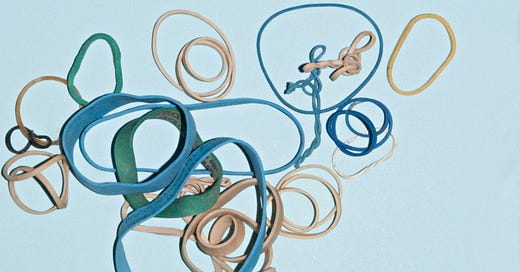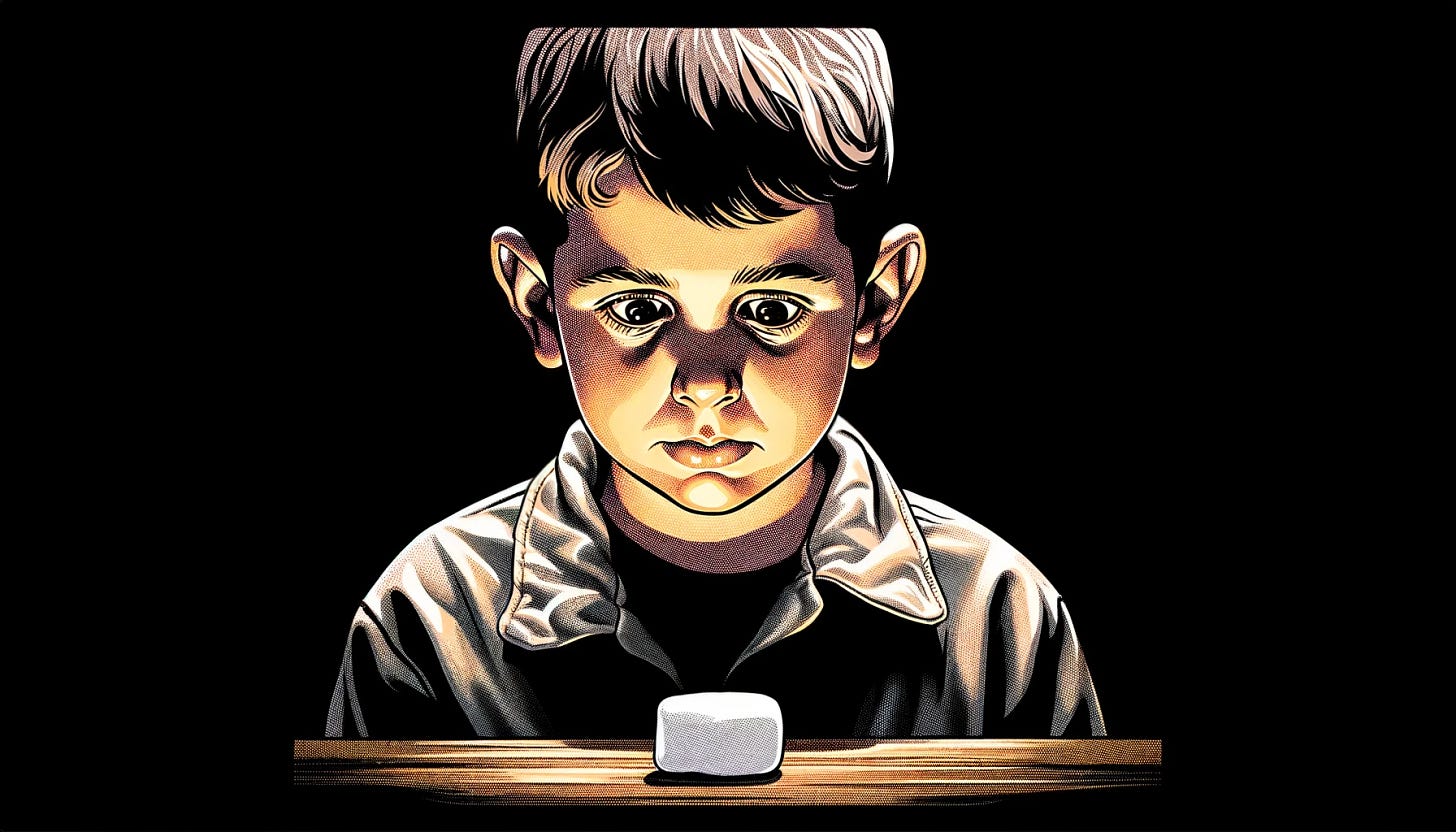There are moments when I realize that most of what I do is write about completely normal, simplistic ideas, tack on a strange metaphor, and give myself a pat on the back believing I’ve shared another glimmering insight with you and my zealous tribe of readers. My infernal editor continues to tell me I need to write about something more original and I keep telling him to go to hell, and after the shouting dies down and he shambles away weeping, I sometimes see his point.
Our post today is about a bag of elastics. If you really want to zoom out, it’s about sacrificing something in the moment for the sake of your future self. Spoiler alert.
Drawers and cabinets and bins are usually pretty great. They let us keep the gazillion things we own in sensible places rather than just having a giant mountain of stuff you need to sort through, whether searching for socks, a spatula, or a bag of oats. And most of the time, the socks stay in the sock drawer and the spatula stays in the kitchen tool cabinet and the oats stay in the baking bin. Yet occasionally we find ourselves with a drawer or cabinet or bin where all that chaos we’ve so sneakily tried to erase comes back in full and glorious force. The Junk Drawer.
You know the one. A screwdriver, a motley crew of batteries (none of which you’re sure work), some old mail that may or may not contain a bill from driving on a toll road, five plastic bread clips with dates spanning the last decade, a nest of elastic bands. In an otherwise orderly home, chaos still invades. That’s how the light gets in, right Leonard?
And Isaac Newton would agree. Actually, forget agree. He wrote the damn book on the subject. The second law of thermodynamics tells us that “the entropy of isolated systems left to spontaneous evolution cannot decrease”. It’ll remain constant or increase. What is entropy? Physicists get all excited talking about heat (or the lack thereof) but that’s because physicists use weird concepts to describe everything. Entropy is chaos, randomness, disorder.
Newton in Jordan terms? Whatever you don’t touch will at best stay the same, or more likely, become more chaotic. Newton may have been talking about apples and moons and planets but we can see the truth of his laws in our neglected cupboards as much as in relationships, car maintenance, and the [dys]function of the team you work on.
Well guess what, Mr Standing-on-the-Shoulders-of-Giants / Discoverer-of-Calculus-Gravity-and-a-Bunch-of-Other-Important-Things / Second-Most-Famous-Apple-User-In-History… I’ve decided to reverse your second law of thermodynamics. To hell with entropy.
Actually, what I’m about to tell you fits perfectly into Newton’s law, so he’ll be resting peacefully for the rest of this post, knowing it was Albert Einstein and not Jordan who messed up his orderly universe.
I have a small ziploc bag for all the elastics I keep in what would otherwise become (and was formerly) my kitchen Junk Drawer.
That’s it, that’s all. Blog post complete.
» Note from the editor: When Mr. Mandel attempted to submit this ridiculous post, I threatened to have ChatGPT finish this half-fleshed out, juvenile idea. When he objected, yet refused to finish writing it himself, I was fortunately able to compile fragments from emails, text messages, napkin scrawlings, and his incessant voice memos into something I hope leaves you feeling enlightened, or at least feeling that this hasn’t been a complete waste of your time. Your beloved writer is clearly too busy and aloof to concern himself with such matters.
Here’s something that has become apparent with my brilliant elastic bag: every time I finish cutting broccoli or unwrap something from my beloved Mennonite butchers and end up with an elastic, I go to toss it in the drawer, forgetting this revolutionary plastic bag of mine. Open the drawer, toss it in, close the drawer, proceed with life.
But. It’s. Not. That. Simple.
I open the drawer, and preparing to toss the elastic in, I see the bag. I curse myself and question how many more simple things I can make complicated. And I lay my eyes on the rest of the respectable, orderly drawer that is continually at risk of becoming a Junk Drawer, and realize the bag is making a difference. So instead of this being a 2-second action it becomes an 8-second action of opening the bag, putting the elastic in, closing the drawer, and proceeding with life. This 8-second action is still a pretty short action but you astute Newtonians will recognize it has increased my action time by a factor of 4. That’s a pretty big factor.
Yet. Were it not for the bag, there would come a time in the not-too-distant future when I would open that drawer and be overcome with shame and confusion, seeing a wild ratsnest of Junk, and if I was eventually to confront this chaos and empty the drawer and properly organize it, it would probably take me longer than the 6-second difference times the 4-6 new elastics I acquire each week.
This is entropy in action. All this extra amount of time I’m writing represents the energy involved in reversing the course of “spontaneous evolution” at the heart of nature and the universe and everything else.
It turns out this principle applies everywhere. The decision to exercise, or mop your floor, or eat kale, or discuss an annoyance at work with the annoyer. In any one of these cases you probably have a more enticing option in the moment, and knowing our time aboard this ship is limited, you can make a good case for choosing the enticing option. Yet when you do, Spontaneous Evolution continues and the silent storm of entropy blows everything into further disarray. Your future self may have fewer enticing options because they’re left to clean up your damn mess.
This all comes back to the Stanford marshmallow experiment in 1972 by Walter Mischel, that golden era of psychological studies that gave us caricature-like simplicity which has allowed us to form all sorts of flawed models of the world. Let’s ignore those wrinkles for now.
The experiment is simple. A soon-to-be-traumatized kid is sitting in a room and the jolly experimenter gives them a marshmallow. Experimenter tells child they’re free to eat the marshmallow whenever they want, but if they can wait until the experimenter comes back, they’ll get a second marshmallow (or a pretzel. Up to the kid). Experimenter leaves, and child is thrown into turmoil.
This is such a famous study because they followed the kids through their lives and it seems like the ability to chill out for five minutes with a marshmallow in front of you predicts pretty much your entire future. Researchers found a strong correlation between those kids who could delay their gratification, and their general fortunes: higher SAT scores, healthier body mass index, fitterhappiermoreproductive. If you can defer the joy of the marshmallow you’re building a muscle that will serve you better in all aspects of your life. Like when you just want to discard a stupid elastic and decide to take 6 extra seconds to put it in a bag instead of letting entropy have its way with everything.
Of course, this gratification-delaying behaviour can be taken to its extreme, where you spend every waking minute in a battle against entropy, setting your future self up for a future he never gets to enjoy because he’s doing the same thing. It reminds me of a Shel Silverstein poem about a guy who gets three wishes and uses each to wish for three more, and when he dies he’s surrounded by unused wishes. If you take anything to its extreme, you’re an extremist, and that’s a lousy thing to be.
And also, guess what? Much like the house, entropy always wins.








Lovely analogy for an organized and proactive life.
I have 2 of those elastic bags which I proudly access regularly- one for elastics and the other for twist ties.